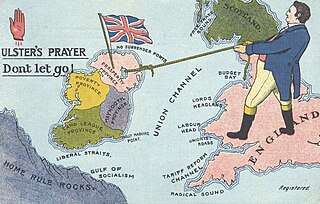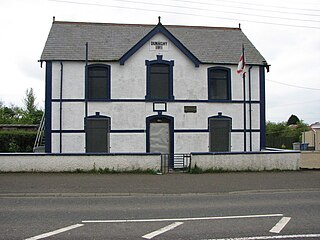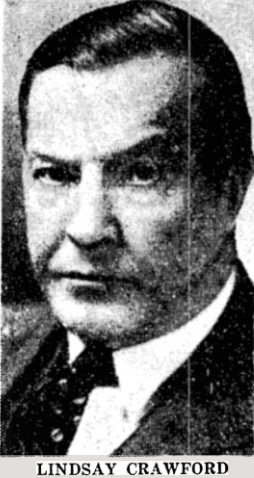Related Research Articles

The Ulster Unionist Party (UUP) is a unionist political party in Northern Ireland. The party was founded as the Ulster Unionist Council in 1905, emerging from the Irish Unionist Alliance in Ulster. Under Edward Carson, it led unionist opposition to the Irish Home Rule movement. Following the partition of Ireland, it was the governing party of Northern Ireland between 1921 and 1972. It was supported by most unionist voters throughout the conflict known as the Troubles, during which time it was often referred to as the Official Unionist Party (OUP).

Unionism in Ireland is a political tradition that favouring union with Great Britain professes loyalty to the crown and constitution of the United Kingdom. The overwhelming sentiment of Ireland's Protestant minority, unionism mobilised in the decades following Catholic Emancipation in 1829 to oppose restoration of a separate Irish parliament. Since Partition in 1921, as Ulster Unionism its goal has been to retain Northern Ireland as a devolved region within the United Kingdom and to resist the prospect of an all-Ireland republic. Within the framework of the 1998 Belfast Agreement, which concluded three decades of political violence, unionists have shared office with Irish nationalists in a reformed Northern Ireland legislature and executive. Currently, they are refusing cooperation in this consociational arrangement to protest what they see as an attempt, post-Brexit, to distance Northern Ireland from Great Britain through European Union compliant trade rules.

Belfast South is a parliamentary constituency in the United Kingdom House of Commons. The current MP is Claire Hanna of the SDLP.

The Independent Loyal Orange Institution is an offshoot of the Orange Institution, a Protestant fraternal organisation based in Northern Ireland. Initially pro-labour and supportive of tenant rights and land reform, over time it moved to a more conservative, unionist position.
Independent Unionist has been a label sometimes used by candidates in elections in the United Kingdom, indicating a support for British unionism.
Ulster Protestant Action (UPA) was an Ulster loyalist political party and Protestant fundamentalist vigilante group in Northern Ireland that was founded in 1956 and re-formed as the Protestant Unionist Party in 1966.
William John Stewart was a Unionist politician in Northern Ireland who formed a Progressive Unionist Association to protest "autocratic" tendencies in the Unionist government and its lack of action on unemployment.

William Johnston was a unionist politician in Ireland, a Member of Parliament for Belfast, distinguished by his independent working-class following and commitment to reform. He first entered the Westminster Parliament as an Independent Conservative in 1868, celebrated for having broken a standing ban on Orange Order processions and as the nominee of an association of "Protestant Workers". At Westminster, Johnston supported the secret ballot; reforms accommodating of trade unions and strike action; land reform; and woman's suffrage. He was succeeded in 1902 as the MP for South Belfast, by Thomas Sloan, similarly supported by loyalist workers in opposition to the official unionist candidates favoured by their employers.

Thomas Henry Sloan (1870–1941) was an Irish unionist and co-founder of the Independent Orange Order (IOO). The choice of a loyalist workers association over the official Conservative Unionist nominee, he represented the Belfast South constituency as an Independent Unionist at the Westminster parliament from 1902 to 1910. He and members of the IOO supported workers in the Belfast Lockout of 1907.
The 1899 Oldham by-election occurred in the summer of that year, and involved a by-election to fill both seats in the two-member Oldham Parliamentary borough. The block voting method allowed each elector to vote for two candidates.
Thomas Lorimer Corbett was a British Conservative politician.
The Belfast Protestant Association was a populist evangelical political movement in the early 20th-century.
The Rochester by-election was a Parliamentary by-election held on 23 September 1903. The constituency returned one Member of Parliament (MP) to the House of Commons of the United Kingdom, elected by the first past the post voting system.

A by-election for the UK House of Commons constituency of Mid Ulster in Northern Ireland was held on 7 March 2013. The election was triggered by the resignation of Martin McGuinness, who had been elected to the seat in 1997 as the Sinn Féin candidate. The election was won by Francie Molloy, also of Sinn Féin.
The Whitby by-election was a Parliamentary by-election held on 1 June 1905. The constituency returned one Member of Parliament (MP) to the House of Commons of the United Kingdom, elected by the first past the post voting system.

The Orkney and Shetland by-election was a Parliamentary by-election held on 18–19 November 1902. The constituency returned one Member of Parliament (MP) to the House of Commons of the United Kingdom, elected by the first past the post voting system.

The Hampstead by-election was a Parliamentary by-election held on 26 October 1905. The constituency returned one Member of Parliament (MP) to the House of Commons of the United Kingdom, elected by the first past the post voting system.
The 1902 Clitheroe by-election was held on 1 August 1902 after the incumbent Liberal MP Sir Ughtred Kay-Shuttleworth was elevated to the House of Lords. The Labour Representation Committee candidate David Shackleton won the by-election unopposed.

Robert Lindsay Crawford (1868–1945) was an Irish Protestant politician and journalist who shifted in his loyalties from Unionism and the Orange Order to the Irish Free State. He was a co-founder of the Independent Orange Order through which he hoped to promote Irish reconciliation and democracy. Later he became a committed Irish nationalist mobilizing support in Canada for Irish self-determination and serving the new Irish state as its trade representative and consul in New York City.
References
- ↑ "Election intelligence". The Times. No. 36829. London. 25 July 1902. p. 5.
- 1 2 "Election intelligence". The Times. No. 36831. London. 28 July 1902. p. 6.
- ↑ "Election intelligence". The Times. No. 36836. London. 2 August 1902. p. 10.
- 1 2 John F. Harbinson, The Ulster Unionist Party, 1882-1973, p.223
- ↑ "Election intelligence". The Times. No. 36848. London. 16 August 1902. p. 8.
- ↑ "Election intelligence". The Times. No. 36850. London. 19 August 1902. p. 3.
- ↑ "No. 27467". The London Gazette . 22 August 1902. p. 5462.
- ↑ The Constitutional Year Book, 1904, published by Conservative Central Office, page 193 (217 in web page)